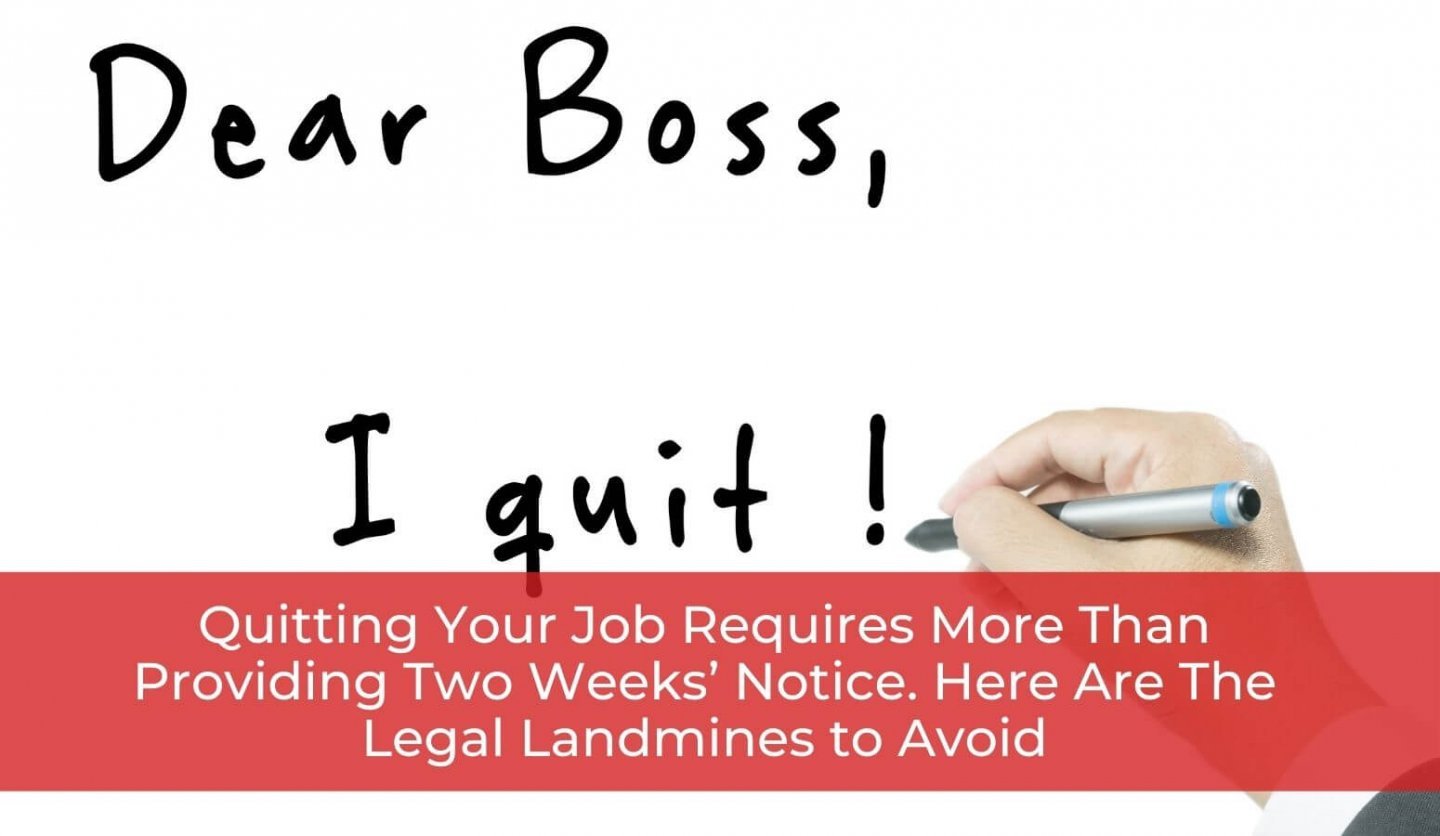
Quitting your job requires more than providing two weeks’ notice. Here are the legal landmines to avoid
Questions about what the new workplace will look like are a key theme in 2022 as employees return to the office in larger numbers. The findings of the recently released Amazon Business Return to the Office Report offer some insight. According to the survey, more than 40 per cent of Canadian workers would rather quit than return to the office full-time – and many of them are now empowered to do so because of the availability of securing remote work elsewhere.
But, for workers who believe resigning is as simple as providing two weeks’ notice, there are a variety of legal land mines to be aware of.
Wrongful resignation. Workers have a legal duty to provide fair notice of their resignation. The amount of notice that is required is sometimes set forth in hiring contracts or is otherwise determined with reference to the period of time it should take for the company to secure a qualified replacement. For senior or highly specialized workers, the duty to provide fair notice of resignation can extend for up to several months. Those workers who fail to provide sufficient notice of resignation can be sued and ordered to pay damages, which can include the costs to recruit and train a replacement or potentially lost productivity because of a vacancy. Although these claims are rare, that will likely change given the difficulties employers are facing in a tight labour market.
Post-employment covenants. Employers are acutely aware of the risks associated with workers leaving to work for competitors and therefore many employment or consulting agreements contain limits on what workers are allowed to do once their job ends. Mostly, these clauses seek to prevent solicitation of clients or co-workers for competitive purposes, but sometimes will go further and prevent workers from accepting employment elsewhere, particularly if they held a senior or key role. Although these restrictions can be difficult to enforce, some employers use the threat of litigation as a tool to discourage workers from resigning for similar opportunities at competitors. This: Already this year, my office has seen a significant uptick in legal disputes concerning these clauses, particularly cease-and-desist letters after workers have resigned to work elsewhere.
Misuse of confidential information. Workers have an implied obligation never to misuse corporate information that is not already within the public domain, even in the absence of any written contractual restrictions. This creates a legal duty to destroy or return any documentation or data saved on their personal computers or devices and any hard copies of materials they may have at home. Failing to do so can have consequences, including lawsuits for damages or injunctions, especially if that data is used for improper purposes, even if not deliberately so. Many employers now send detailed letters to resigning employees requiring them to sign a declaration that they no longer have access to confidential information.
Fiduciary obligations. These are legal duties which apply to senior or specialized workers and, even without a written contract, require them to continue to act in the best interests of a former employer after employment ends. If they apply, fiduciary obligations are similar to a noncompete or non-solicitation requirement for a reasonable period of time.
Non-disparagement clauses. Employers are increasingly requiring workers to sign agreements stating they will not disparage the company following their departure. This can be problematic for anyone contemplating posting unflattering online opinions about their experiences working at the company, provided it can be traced back to them.
In light of these potential concerns, for anyone contemplating a resignation, here is a checklist to first consider.
Review your employment or consulting contract to determine what your obligations are upon departure. Pay particular attention to whether any contractual resignation notice period exists and be certain to adhere to it. This could be as little as a few weeks’ notice or as much as several months. Failing to provide the stipulated period of resignation notice exposes you to the aforementioned claim for wrongful resignation.
Determine whether you have any written or implied post-employment obligations. If the answer is yes and you are considering working in a new role that may be in competition with your former employer, you should quickly obtain legal advice to review the clauses and assess whether they stand a chance of being upheld in court or can be disregarded.
The manner in which your resignation is worded can become very important. If there is a possibility of a dispute, I often counsel clients to indicate that the decision to resign was in response to the employer’s behaviour and not a truly voluntary choice. Doing this may preserve certain legal defences to any claims, which would not otherwise be available.
Thoroughly review your personal e-mail accounts and digital devices to ensure that you will not inadvertently retain client information or other sensitive commercial data. Similarly, do not continue to access an employer’s computer network or electronic devices following a resignation even if your access is not immediately discontinued. Not only will this expose you to potential liability but can also inadvertently lead to claims against your new employer.
Update your social media accounts and online presence to avoid giving off the impression you are still working for a company in order to maintain contact with its clientele, especially if you are in a sales-based role.
Daniel A. Lublin is a founding partner of Whitten & Lublin Employment and Labour Lawyers.



